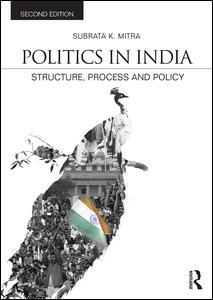Politics in India (2nd Ed.) Structure, Process and Policy
Auteur : Mitra Subrata

The second edition of this textbook brings together general political theory and the comparative method to interpret socio-political phenomena and issues that have occupied the Indian state and society since 1947. It considers the progress that India has made in some of the most challenging aspects of post-colonial politics such as governance, democracy, economic growth, welfare, and citizenship. Looking at the changed global role of India, its standing in the G-20 and BRICS, as well as the implications of the 2014 Indian general elections for state and society, this updated edition also includes sections on the changing socio-political status of women in India, corruption and terrorism. The author raises several key questions relevant to Indian politics, including:
? Why has India succeeded in making a relatively peaceful transition from colonial rule to a resilient, multi-party democracy in contrast to its South Asian neighbours?
? How has the interaction of modern politics and traditional society contributed to the resilience of post-colonial democracy?
? How did India?s economy moribund?for several decades following Independence?make a breakthrough into rapid growth and can India sustain it?
? And finally, why have collective identity and nationhood emerged as the core issues for India in the twenty-first century and with what implications for Indian democracy?
The textbook goes beyond India by asking about the implications of the Indian case for the general and comparative theory of the post-colonial state. The factors which might have caused failures in democracy and governance are analysed and incorporated as variables into a model of democratic governance. In addition to pedagogical features such as text boxes, a set of further readings is provided to guide readers who wish to go beyond the remit of this text. The book will be essential reading for undergraduate students and researchers in South Asian and Asian studies, political science, development studies, sociology, comparative politics and political theory.
1. Introduction: Modern politics and traditional society in the making of Indian democracy
2. Pre-modern Pasts of Modern Politics: The Legacies of British Colonial Rule
3. Politics and social change: From homo hierarchicus to an egalitarian and plural society
4. Strength with Democracy: Separation and Division of Powers, and the Imperative of Leadership
5. The Federal Structure: Balancing national unity and regional diversity
6. Elections, Political Parties, Demand Groups and Political Movements: Multiple modes of representation, articulation and aggregation of interests
7. Economic Development and Social Justice
8. Engaging the World: Foreign policy and nation-building in India
9. Democracy and Development in a Post-colonial Context: The Indian Puzzle
10. Conclusion: Emergent India
11.Notes on further Reading
Subrata K. Mitra is currently Visiting Research Professor and Director at the Institute of South Asian Studies at the National University of Singapore, and Professor Emeritus at the South Asia Institute, Heidelberg University, Germany. He has published a number of books with Routledge, including The Puzzle of India’s Governance (2005), (co-author) A Political and Economic Dictionary of South Asia (2006), Modern Politics of South Asia (5 volumes, 2008) and Power, Protest and Participation (1992). He is the series editor of the Routledge Advances in South Asian Studies series.
Date de parution : 11-2017
17.4x24.6 cm
Date de parution : 11-2017
17.4x24.6 cm
Thème de Politics in India :
Mots-clés :
Tamil Nadu; BJP’s Prime Ministerial Candidate; K; Mitra Subrata; UPA Government; BJP’s Strategy; Indian Law Firm; India’s Modern Institutions; India’s Democratic Political System; Armed Forces Special Powers Act; Niraja Gopal Jayal; India’s Political Economy; Laloo Prasad Yadav; Nehru; Jawaharlal Nehru; Central Government; India’s Non-aligned Policy; Indian Foreign Policy; India’s Political Culture; Vote Hungry Politicians; India’s Constitutional Development; Gandhi National Rural Employment Guarantee; Hindu Nationalist Bharatiya Janata Party; Mahatma Gandhi National Rural Employment; National Rural Employment Guarantee Act; 73rd Amendment; India Act



